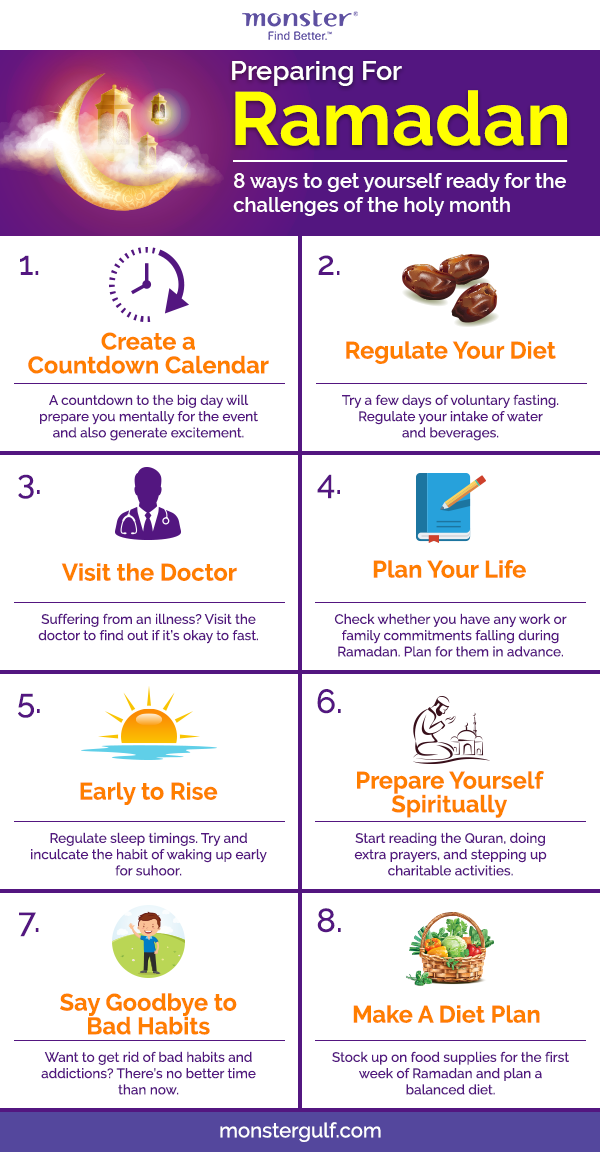Ramadan, the ninth month of the Muslim calendar, is a time for spiritual refection and worship. However, long hours of fasting along with disrupted sleep cycles could end up taking a heavy toll on your mental and physical health, thereby leading to symptoms like exhaustion, fatigue, dehydration, aches and pains, anxiety and so on.
That’s why a little bit of preparation ahead of Ramadan could help you adjust better to the rigours and restrictions of the holy month. Follow these tips to prepare yourself mentally and physically for Ramadan to facilitate your transition to the new routine.
As the sacred month of Ramadan approaches, Muslims around the world eagerly anticipate the opportunity to spiritually recharge, seek closeness to Allah, and engage in acts of worship and self-reflection.
While Ramadan is a time of immense spiritual significance, it also requires careful physical and mental preparation to fully benefit from this blessed month.
8 Effective Ways to Mentally and Physically Prepare Yourself for Ramadan
- Set Clear Spiritual Goals: Before Ramadan begins, take some time to set clear and achievable spiritual goals. Consider what you hope to achieve during this month, whether it’s memorizing a portion of the Quran, performing extra prayers, or seeking forgiveness for past sins. Having specific goals will help you stay focused and motivated throughout Ramadan.
- Gradual Adjustment of Meal Times: Adjusting your meal times gradually in the days leading up to Ramadan can make fasting easier on your body. Start by having a pre-dawn meal (suhoor) a bit earlier each day until it aligns with the actual fasting time. This gradual adjustment can help your body adapt to the fasting routine.
- Stay Hydrated: Dehydration can be a significant challenge during Ramadan, especially in hot climates. To prepare, ensure you are well-hydrated in the days leading up to Ramadan. Drink plenty of water during non-fasting hours to minimize the risk of dehydration during the fast.
- Stock Up on Nutritious Foods: Plan your suhoor and iftar meals thoughtfully. Stock up on nutritious foods, including fruits, vegetables, protein sources, and complex carbohydrates. These foods will provide sustained energy throughout the day and help you maintain good health during Ramadan.
- Get Adequate Rest:Adequate sleep is crucial during Ramadan to maintain energy levels and mental clarity. Make an effort to establish a consistent sleep schedule and prioritize restful sleep to help you stay alert and focused during the day.
- Daily Quranic Recitation: Allocate time each day to recite and reflect upon the Quran. Reading the Quran daily during Ramadan is a spiritually uplifting practice that can deepen your connection with Allah and enhance your understanding of His message.
- Practice Gratitude and Generosity: Use the days leading up to Ramadan to cultivate a spirit of gratitude and generosity. Reflect on the blessings in your life and consider how you can give back to those in need. Preparing yourself mentally to be more charitable and compassionate can enhance the spiritual benefits of Ramadan.
- Embrace a Positive Mindset: Lastly, maintain a positive mindset throughout Ramadan. Approach each day with gratitude and a sense of purpose. Be patient with yourself, as fasting can be challenging at times. Remember that every effort you make to draw closer to Allah during this month is rewarded.
Conclusion:
Mentally and physically preparing yourself for Ramadan is a vital step in ensuring a spiritually fulfilling and rewarding experience. By setting clear goals, adjusting your routine, maintaining good nutrition, and nurturing a positive mindset, you can maximize the benefits of this blessed month.
Ramadan is an opportunity for self-improvement, spiritual growth, and acts of kindness, and with careful preparation, you can make the most of this sacred time in the Islamic calendar. May your Ramadan be filled with blessings, peace, and spiritual enlightenment.
FAQ on Ways to Prepare Yourself for Ramadan
Q1. What is the significance of preparing for Ramadan?
Answer: Preparing for Ramadan is essential to make the most of this sacred month. It allows you to set spiritual goals, adjust to the fasting routine, and ensure you engage in acts of worship and self-improvement effectively.
Q2. How can I set clear spiritual goals for Ramadan preparation?
Answer: Start by self-reflecting on your spiritual needs and areas for improvement. Then, set specific goals, such as reading the Quran daily, performing extra prayers, or increasing acts of charity, to guide your actions during Ramadan.
Q3. What dietary adjustments should I make in preparation for fasting during Ramadan?
Answer: Gradually adjust your meal times, ensuring suhoor (pre-dawn meal) aligns with fasting hours. Stock up on nutritious foods like fruits, vegetables, and complex carbohydrates to sustain your energy throughout the day.
Q4. How can I maintain good health during Ramadan preparation?
Answer: Prioritize hydration by drinking plenty of water during non-fasting hours. Get adequate rest and maintain a consistent sleep schedule. Additionally, focus on balanced nutrition and exercise to stay in good health.
Q5. What is the importance of embracing a positive mindset in Ramadan preparation?
Answer: A positive mindset is essential for a successful Ramadan. It helps you approach fasting and acts of worship with enthusiasm and patience. Maintaining a positive outlook also enhances your overall spiritual experience.
Related Articles :




